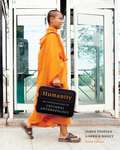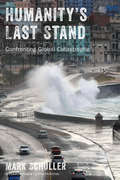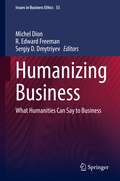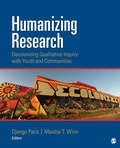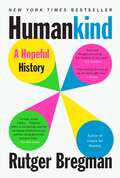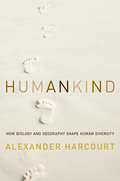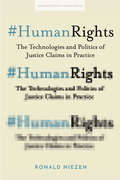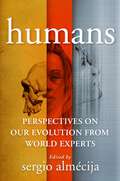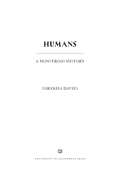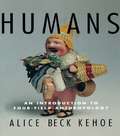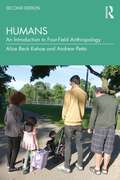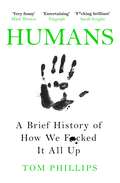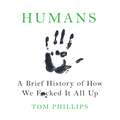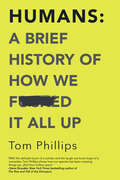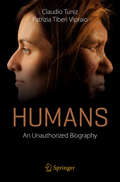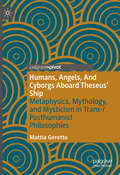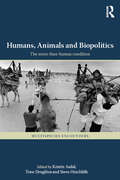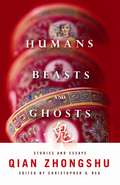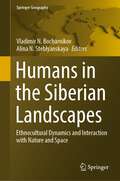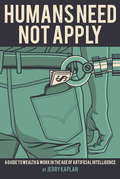- Table View
- List View
Humanity: An Introduction to Cultural Anthropology (9th Edition)
by James Peoples Garrick BaileyUsing engaging stories and clear writing, CENGAGE ADVANTAGE BOOKS: HUMANITY: AN INTRODUCTION TO CULTURAL ANTHROPOLOGY, Ninth Edition, introduces cultural anthropology within a solid framework centered on globalization and culture change. Peoples and Bailey focus on the social and cultural consequences of globalization, emphasizing culture change and world problems. The book's engaging narrative provides new ways of looking at many of the challenges facing the world in this century. As you explore more contemporary issues, including recent debates on gay marriage, cultural and economic globalization, population growth, hunger, and the survival of indigenous cultures, you will gain a better understanding of the cultural information you need to successfully navigate in today's global economy. The authors emphasize the diversity of humanity and reveal why an appreciation and tolerance of cultural differences is critical in the modern world.
Humanity 2.0
by Steve FullerDeveloping directly from Fuller's recent book Humanity 2. 0 , this is the first book to seriously consider what a 'post-' or 'trans'-' human state of being might mean for who we think we are, how we live, what we believe and what we aim to be.
Humanity without Dignity: Moral Equality, Respect, and Human Rights
by Andrea SangiovanniWhy are all persons due equal respect? Andrea Sangiovanni rejects the view that human dignity is grounded in our capacities for reason, love, etc. Rather than focus on the basis for equality, we should focus on inequality: Why and when is it wrong to treat others as inferior? Moral equality, he writes, is best explained by a rejection of cruelty.
Humanity's Last Stand: Confronting Global Catastrophe
by Mark SchullerAre we as a species headed towards extinction? As our economic system renders our planet increasingly inhospitable to human life, powerful individuals fight over limited resources, and racist reaction to migration strains the social fabric of many countries. How can we retain our humanity in the midst of these life-and-death struggles? Humanity’s Last Stand dares to ask these big questions, exploring the interconnections between climate change, global capitalism, xenophobia, and white supremacy. As it unearths how capitalism was born from plantation slavery and the slaughter of Indigenous people, it also invites us to imagine life after capitalism. The book teaches its readers how to cultivate an anthropological imagination, a mindset that remains attentive to local differences even as it identifies global patterns of inequality and racism. Surveying the struggles of disenfranchised peoples around the globe from frontline communities affected by climate change, to #BlackLivesMatter activists, to Indigenous water protectors, to migrant communities facing increasing hostility, anthropologist Mark Schuller argues that we must develop radical empathy in order to move beyond simply identifying as “allies” and start acting as “accomplices.” Bringing together the insights of anthropologists and activists from many cultures, this timely study shows us how to stand together and work toward a more inclusive vision of humanity before it’s too late. More information and instructor resources (https://humanityslaststand.org)
Humanizing Business: What Humanities Can Say to Business (Issues in Business Ethics #53)
by Michel Dion R. Edward Freeman Sergiy D. DmytriyevThis book is about humanizing business. In contrast to the mainstream modern management and leadership literature, this book provides distinctly humane perspectives on business. The volume travels outside the world of business to explore what Humanities – such as Philosophy, History, Literature, Creative Arts, and Cultural Studies – can offer to business. Renowned scholars from different Humanities disciplines, as well as management researchers exploring the heritage of Humanities, convey what it actually means to make business more humane. The book strives to humanize business. It aims to show that it is not people who have to suppress their human feelings, aspirations, and beliefs when they are at their workplaces, but it is business itself that needs to be redefined by the human norms of human beings. Companies should care about their employees and other stakeholders letting them be themselves, i.e. be human, at work and beyond. The book will be of interest to management scholars across various business disciplines. It can also be used as teaching material in the classroom with MBA students, especially in Business Ethics, Business and Society, Sustainability, Organizational Behavior, Human Resource Management and other management courses. The volume will also be of interest to scholars that work in different Humanities fields and whose interests span organizations, management, and business. Finally, many practitioners in the business world, especially those in managerial and leadership positions, will find the book both thought-provoking and useful for them as well.Chapter 37 is available open access under a Creative Commons Attribution 4.0 International License via link.springer.com.
Humanizing Immigration: How to Transform Our Racist and Unjust System
by Bill Ong Hing&“Incisive and compelling, reflecting the painful wisdom and knowledge that Bill Ong Hing has accrued over the course of fifty years..." --Michelle Alexander, author of The New Jim CrowFirst book to argue that immigrant and refugee rights are part of the fight for racial justice; offers a humanitarian approach to reform and abolition.Representing non-citizens caught up in what he calls the immigration and enforcement &“meat grinder&”, Bill Ong Hing witnessed their trauma, arriving at this conclusion: migrants should have the right to free movement across borders—and the right to live free of harassment over immigration status.He cites examples of racial injustices endemic in immigration law and enforcement, from historic courtroom cases to the recent treatment of Haitian migrants. Hing includes histories of Mexican immigration, African migration and the Asian exclusion era, all of which reveal ICE abuse and a history of often forgotten racist immigration laws.While ultimately arguing for the abolishment of ICE, Hing advocates for change now. With fifty years of law practice and litigation, Hing has represented non-citizens -- from gang members to asylum seekers fleeing violence, and from individuals in ICE detention to families at the US southern border seeking refuge.Hing maps out major reforms to the immigration system, making an urgent call for the adoption of a radical, racial justice lens. Readers will understand the root causes of migration and our country&’s culpability in contributing to those causes.
Humanizing Research: Decolonizing Qualitative Inquiry With Youth and Communities
by Django Paris Maisha T. WinnWhat does it mean to conduct research for justice with youth and communities who are marginalized by systems of inequality based on race, ethnicity, sexuality, citizenship status, gender, and other categories of difference? In this collection, editors Django Paris and Maisha Winn have selected essays written by top scholars in education on humanizing approaches to qualitative and ethnographic inquiry with youth and their communities. Vignettes, portraits, narratives, personal and collaborative explorations, photographs, and additional data excerpts bring the findings to life for a better understanding of how to use research for positive social change.
Humankind: A Hopeful History
by Rutger Bregman<P><P>If there is one belief that has united the left and the right, psychologists and philosophers, ancient thinkers and modern ones, it is the tacit assumption that humans are bad. It's a notion that drives newspaper headlines and guides the laws that shape our lives. From Machiavelli to Hobbes, Freud to Pinker, the roots of this belief have sunk deep into Western thought. Human beings, we're taught, are by nature selfish and governed primarily by self-interest. <P><P>But what if it isn't true? International bestseller Rutger Bregman provides new perspective on the past 200,000 years of human history, setting out to prove that we are hardwired for kindness, geared toward cooperation rather than competition, and more inclined to trust rather than distrust one another. In fact this instinct has a firm evolutionary basis going back to the beginning of Homo sapiens. <P><P>From the real-life Lord of the Flies to the solidarity in the aftermath of the Blitz, the hidden flaws in the Stanford prison experiment to the true story of twin brothers on opposite sides who helped Mandela end apartheid, Bregman shows us that believing in human generosity and collaboration isn't merely optimistic---it's realistic. <P><P>Moreover, it has huge implications for how society functions. When we think the worst of people, it brings out the worst in our politics and economics. But if we believe in the reality of humanity's kindness and altruism, it will form the foundation for achieving true change in society, a case that Bregman makes convincingly with his signature wit, refreshing frankness, and memorable storytelling. <P><P><b>A New York Times Bestseller</b>
Humankind: How Biology and Geography Shape Human Diversity
by Alexander H. HarcourtAn innovative and illuminating look at how the evolution of the human species has been shaped by the world around us, from anatomy and physiology, to cultural diversity and population density. Where did the human species originate? Why are tropical peoples much more diverse than those at polar latitudes? Why can only Japanese peoples digest seaweed? How are darker skin, sunlight, and fertility related? Did Neanderthals and Homo Sapiens ever interbreed? In Humankind, U. C. Davis professor Alexander Harcourt answers these questions and more, as he explains how the expansion of the human species around the globe and our interaction with our environment explains much about why humans differ from one region of the world to another, not only biologically, but culturally. What effects have other species had on the distribution of humans around the world, and we, in turn, on their distribution? And how have human populations affected each other's geography, even existence? For the first time in a single book, Alexander Harcourt brings these topics together to help us understand why we are, what we are, where we are. It turns out that when one looks at humanity's expansion around the world, and in the biological explanations for our geographic diversity, we humans are often just another primate. Humanity's distribution around the world and the type of organism we are today has been shaped by the same biogeographical forces that shape other species.
#HumanRights: The Technologies and Politics of Justice Claims in Practice (Stanford Studies in Human Rights)
by Ronald NiezenSocial justice and human rights movements are entering a new phase. Social media, artificial intelligence, and digital forensics are reshaping advocacy and compliance. Technicians, lawmakers, and advocates, sometimes in collaboration with the private sector, have increasingly gravitated toward the possibilities and dangers inherent in the nonhuman. #HumanRights examines how new technologies interact with older models of rights claiming and communication, influencing and reshaping the modern-day pursuit of justice. Ronald Niezen argues that the impacts of information technologies on human rights are not found through an exclusive focus on sophisticated, expert-driven forms of data management but in considering how these technologies are interacting with other, "traditional" forms of media to produce new avenues of expression, public sympathy, redress of grievances, and sources of the self. Niezen considers various ways that the pursuit of justice is happening via new technologies, including crowdsourcing, social media–facilitated mobilizations (and enclosures), WhatsApp activist networks, and the selective attention of Google's search engine algorithm. He uncovers how emerging technologies of data management and social media influence the ways that human rights claimants and their allies pursue justice, and the "new victimology" that prioritizes and represents strategic lives and types of violence over others. #HumanRights paints a striking and important panoramic picture of the contest between authoritarianism and the new tools by which people attempt to leverage human rights and bring the powerful to account.
Humans: Perspectives on Our Evolution from World Experts
by Sergio AlmécijaHow did humanity evolve? And what does our evolutionary history tell us about what it means to be human? These questions are fundamental to our identity as individuals and as a species and to our relationship with the world. But there are almost as many answers to them as there are scientists who study these topics.This book brings together more than one hundred top experts, who share their insights on the study of human evolution and what it means for understanding our past, present, and future. Sergio Almécija asks leading figures across paleontology, primatology, archaeology, genetics, and many other disciplines about their lives, their work, and the philosophical significance of human evolution. They reflect on questions that are both fun and profound: What set you down your career path? Are humans special? Where and when would you travel in a time machine? Does human evolution offer lessons for society? Is evolution compatible with spirituality and religion?Humans features a remarkably accomplished cast of contributors, including Kay Behrensmeyer, Frans de Waal, Nina Jablonski, Richard Leakey, Robert Sapolsky, and Richard Wrangham. Together, they provide a refreshing, personable, engaging, cross-disciplinary, and thought-provoking exploration of different—even diametrically opposed—ideas about our nature and evolution, what makes humans unique, and what our future might hold. This book also offers practical suggestions for readers seeking to embark on a scientific career.
Humans: A Monstrous History
by Surekha DaviesA history of how humans have created monsters out of one another—from our deepest fears—and what these monsters tell us about humanity's present and future. Monsters are central to how we think about the human condition. Join award-winning historian of science Dr. Surekha Davies as she reveals how people have defined the human in relation to everything from apes to zombies, and how they invented race, gender, and nations along the way. With rich, evocative storytelling that braids together ancient gods and generative AI, Frankenstein's monster and E.T., Humans: A Monstrous History shows how monster-making is about control: it defines who gets to count as normal. In an age when corporations increasingly see people as obstacles to profits, this book traces the long, volatile history of monster-making and charts a better path for the future. The result is a profound, effervescent, empowering retelling of the history of the world for anyone who wants to reverse rising inequality and polarization. This is not a history of monsters, but a history through monsters.
Humans: An Introduction to Four-Field Anthropology
by Alice Beck KehoeFirst Published in 1998. Routledge is an imprint of Taylor & Francis, an informa company.
Humans: An Introduction to Four-Field Anthropology
by Alice Beck Kehoe Andrew J PettoHumans is a concise, jargon-free introduction to four-field anthropology. This book outlines and breaks down a complex discipline to identify some of the most important and relevant questions in anthropology. It provides students with an understanding of the unity of the human species, the adaptation of societies to their environments (physical and political), and an appreciation of the power of socialization into a culture. The authors ensure that the book takes a balanced approach to all four fields, covering topics such as cultural relativism, humans as a biological species, primates, communicating, economics, and religion. Pedagogical features include a study guide and notes for instructors. This second edition is fully updated with brand new material on evolution, genetics, and archaeology to reflect the latest research and recent changes in the field. This book is an ideal introduction for students embarking on an anthropology course for the first time.
Humans: A Brief History of How We F*cked It All Up
by Tom Phillips'This book is brilliant. Utterly, utterly brilliant. Apart from the epilogue, which is idiotic' Jeremy Clarkson'F*cking brilliant' Sarah KnightAN EXHILARATING JOURNEY THROUGH THE MOST CREATIVE AND CATASTROPHIC F*CK-UPS OF HUMAN HISTORYIn the seventy thousand years that modern human beings have walked this earth, we've come a long way. Art, science, culture, trade - on the evolutionary food chain, we're real winners. But, frankly, it's not exactly been plain sailing, and sometimes - just occasionally - we've managed to really, truly, quite unbelievably f*ck things up.From Chairman Mao's Four Pests Campaign, to the American Dustbowl; from the Austrian army attacking itself one drunken night, to the world's leading superpower electing a reality TV mogul as President... it's pretty safe to say that, as a species, we haven't exactly grown wiser with age.So, next time you think you've really f*cked up, this book will remind you: it could be so much worse...FURTHER PRAISE FOR HUMANS:'Very funny' Mark Watson'A light-touch history of moments when humans have got it spectacularly wrong... Both readable and entertaining' The Telegraph'Chronicles humanity's myriad follies down the ages with malicious glee and much wit ... a rib-tickling page-turner' Business Standard'A timely, irreverent gallop through thousands of years of human stupidity' Nicholas Griffin, Ping-Pong Diplomacy: The Secret History Behind the Game That Changed the World
Humans: A Brief History of How We F*cked It All Up
by Tom Phillips'This book is brilliant. Utterly, utterly brilliant' Jeremy Clarkson'F*cking brilliant' Sarah KnightREAD FOR YOU BY CRITICALLY ACCLAIMED COMIC AND HUMAN NISH KUMAR, THIS IS AN EXHILARATING JOURNEY THROUGH THE MOST CREATIVE AND CATASTROPHIC F*CK-UPS OF HUMAN HISTORY.In the seventy thousand years that modern human beings have walked this earth, we've come a long way. Art, science, culture, trade - on the evolutionary food chain, we're real winners. But, frankly, it's not exactly been plain sailing, and sometimes - just occasionally - we've managed to really, truly, quite unbelievably f*ck things up.From Chairman Mao's Four Pests Campaign, to the American Dustbowl; from the Austrian army attacking itself one drunken night, to the world's leading superpower electing a reality TV mogul as President... it's pretty safe to say that, as a species, we haven't exactly grown wiser with age.So, next time you think you've really f*cked up, this book will remind you: it could be so much worse...FURTHER PRAISE FOR HUMANS:'Very funny' Mark Watson'A light-touch history of moments when humans have got it spectacularly wrong... Both readable and entertaining' The Telegraph'Chronicles humanity's myriad follies down the ages with malicious glee and much wit ... a rib-tickling page-turner' Business Standard'A timely, irreverent gallop through thousands of years of human stupidity' Nicholas Griffin, Ping-Pong Diplomacy: The Secret History Behind the Game That Changed the World(P)2018 Headline Publishing Group Ltd
Humans: A Brief History of How We F*cked It All Up
by Tom Phillips“If Sapiens was a testament to human sophistication, this history of failure cheerfully reminds us that humans are mostly idiots.” —Greg Jenner, author of A Million Years in a DayNow an International BestsellerA Toronto Star–Bestselling Book of the YearModern humans have come a long way in the seventy thousand years they’ve walked the earth. Art, science, culture, trade—on the evolutionary food chain, we’re true winners. But it hasn’t always been smooth sailing, and sometimes—just occasionally—we’ve managed to truly f*ck things up.Weaving together history, science, politics and pop culture, Humans offers a panoramic exploration of humankind in all its glory, or lack thereof. From Lucy, our first ancestor, who fell out of a tree and died, to General Zhou Shou of China, who stored gunpowder in his palace before a lantern festival, to the Austrian army attacking itself one drunken night, to the most spectacular fails of the present day, Humans reveals how even the most mundane mistakes can shift the course of civilization as we know it. Lively, wry and brimming with brilliant insight, this unique compendium offers a fresh take on world history and is one of the most entertaining reads of the year.“It’s hard to imagine someone other than Phillips pulling off a 250+ page roast of mankind, but his perfect blend of brilliance and goofiness makes it a joy to read.” —Buzzfeed“With the delicate touch of a scholar and the laugh-out-loud chops of a comedian, Tom Phillips shows us how our species has been messing things up . . . [for] four million years.” —Steve Brusatte, New York Times–bestselling author
Humans
by Claudio Tuniz Patrizia Tiberi VipraioBased on the latest scientific discoveries, this "unauthorized biography" of the Humans recounts the story of our distant ancestors during the past 6 million years, since the line of our extended family separated from that leading to modern chimpanzees. The book explains how different species evolved, both anatomically and cognitively, and describes the impacts of climatic and environmental change on this process. It also explores the nature of relationships within and between species, describes their everyday lives, and discusses how isolated individuals became members of larger social groups. The concluding chapters highlight the paramount importance of the emergence of symbolic thought and discuss its contribution to the formation of institutions, societies, and economies. The multifaceted picture that emerges will help the reader to make sense not only of "what we were", but also of "what we are", here and now. The book is both entertaining and rigorous in integrating results from a wide selection of disciplines. It will be particularly suitable for people with a curious and open mind, keen to overcome long-standing prejudices on man's place in nature.
Humans and Devices in Medical Contexts: Case Studies from Japan (Health, Technology and Society)
by Susanne Brucksch Kaori SasakiThis book explores the ways in which socio-technical settings in medical contexts find varying articulations in a specific locale. Focusing on Japan, it consists of nine case studies on topics concerning: experiences with radiation in Hiroshima, Nagasaki, and Fukushima; patient security, end-of-life and high-tech medicine in hospitals; innovation and diffusion of medical technology; and the engineering and evaluating of novel devices in clinical trials. The individual chapters situate humans and devices in medical settings in their given semantic, pragmatic, institutional and historical context. A highly interdisciplinary approach offers deep insights beyond the manifold findings of each case study, thereby enriching academic discussions on socio-technical settings in medical contexts amongst affiliated disciplines. This volume will be of broad interest to scholars, practitioners, policy makers and students from various disciplines, including Science and Technology Studies (STS), medical humanities, social sciences, ethics and law, business and innovation studies, as well as biomedical engineering, medicine and public health.
Humans, Angels, And Cyborgs Aboard Theseus' Ship: Metaphysics, Mythology, and Mysticism in Trans-/Posthumanist Philosophies
by Mattia GerettoThis book addresses the most suggestive themes of transhumanism and critical posthumanism by placing them in dialogue with classic problems of metaphysics, and with some great thinkers of the past (Bruno, Spinoza, and above all Leibniz). The main purpose of this comparison is to invite transhumanists and critical posthumanists to consider a highly complex problematic tradition rooted in the history of philosophy. This study also makes use of examples drawn from the history of mythology, angelology, and mysticism. At the same time, the book promotes dialogue between scholars of classical metaphysics and philosophy of religion, and the potential metaphysical/spiritual theories developed independently by transhumanist and posthumanist thinkers within an anti-dualist and naturalistic philosophical framework. The goal is to ‘enhance’ contemporary transhumanism and posthumanism by promoting the need to safeguard intelligence as a principle, without falling into the trap of a violent and egotistic metaphysics.
Humans, Animals and Biopolitics: The more-than-human condition (Multispecies Encounters)
by Steve Hinchliffe Kristin Asdal Tone DruglitroHuman-animal co-existence is central to a politics of life, how we order societies, and to debates about who ’we’ humans think ’we’ are. In other words, our ways of understanding and ordering human-animal relations have economic and political implications and affect peoples’ everyday lives. By bringing together historically-oriented approaches and contemporary ethnographies which engage with science and technology studies (STS), this book reflects the multi-sited, multi-species, multi-logic and multiple ways in which lives are and have been assembled, disassembled, practised and possibly policed and politicized. Instead of asking only how control and knowledge are and have been extended over life, the chapters in this book also look at what happens when control fails, at practices which defy orders, escape detection, fail to produce or only loosely hang together. In doing so the book problematises and extends the Foucauldian notion of biopolitics that has been such a central analytical concept in studies of human-animal relations and provides a unique resource of cases and theoretical refinements regarding the ways in which we live together with more than human others .
Humans, Beasts, and Ghosts: Stories and Essays (Weatherhead Books on Asia)
by Zhongshu QianQian Zhongshu was one of twentieth-century China's most ingenious literary stylists, one whose insights into the ironies and travesties of modern China remain stunningly fresh. Between the early years of the Second Sino-Japanese War (1937-1945) and the Communist takeover in 1949, Qian wrote a brilliant series of short stories, essays, and a comedic novel that continue to inspire generations of Chinese readers.With this long-awaited translation, English-language readers can immerse themselves in the invention and satirical wit of one of the world's great literary cosmopolitans. This collection brings together Qian's best short works, combining his iconoclastic essays on the "book of life" from Written in the Margins of Life (1941) with the four masterful short stories of Human, Beast, Ghost (1946). His essays elucidate substantive issues through deceptively simple subjects-the significance of windows versus doors, for example, or the blind spots of literary critics-and assert the primacy of critical and creative independence. His stories blur the boundaries between humans, beasts, and ghosts as they struggle through life, death, and resurrection. Christopher G. Rea situates these works within China's wartime politics and Qian's literary vision, highlighting significant changes that Qian Zhongshu made to different editions of his writings and providing unprecedented insight into the author's creative process.
Humans in Shackles: An Atlantic History of Slavery
by Ana Lucia AraujoA sweeping narrative history of the Atlantic slave trade and slavery in the Americas. During the era of the Atlantic slave trade, more than twelve million enslaved Africans were forcibly transported to the Americas in cramped, inhumane conditions. Many of them died on the way, and those who survived had to endure further suffering in the violent conditions that met them onshore. Covering more than three hundred years, Humans in Shackles grapples with this history by foregrounding the lived experience of enslaved people in tracing the long, complex history of slavery in the Americas. Based on twenty years of research, this book not only serves as a comprehensive history; it also expands that history by providing a truly transnational account that emphasizes the central role of Brazil in the Atlantic slave trade. Additionally, it is deeply informed by African history and shows how African practices and traditions survived and persisted in the Americas among communities of enslaved people. Drawing on primary sources including travel accounts, pamphlets, newspaper articles, slave narratives, and visual sources such as artworks and artifacts, Araujo illuminates the social, cultural, and religious lives of enslaved people working in plantations and urban areas, building families and cultivating affective ties, congregating and re-creating their cultures, and organizing rebellions. Humans in Shackles puts the lived experiences of enslaved peoples at the center of the story and investigates the heavy impact these atrocities have had on the current wealth disparity of the Americas and rampant anti-Black racism.
Humans in the Siberian Landscapes: Ethnocultural Dynamics and Interaction with Nature and Space (Springer Geography)
by Vladimir N. Bocharnikov Alina N. SteblyanskayaThis book considers theoretical issues of the ethnocultural landscape concepts at large as well as examples of its practical application in ethnic communities of Siberia. It reveals the patterns of the processes of penetration, settlement, development and adaptation of Siberian populations from Paleolithic time to Russian colonization in the era of the Russian Empire, during Soviet modernization and in the face of modern challenges. The authors consider the principal interactions (character, stages, conditions), system-related evidence and phenomena that determine the diverse specifics and multidirectional vectors of a change in the ethnic (social, cultural, economic, legal) presence in large subregions of Siberia in the mirror of various theoretical paradigms. This transdisciplinary volume appeals to researchers, lecturers and students in the fields of geography, history, philosophy, anthropology, ecology, archaeology and interfaces to many other disciplines.
Humans Need Not Apply: A Guide to Wealth & Work in the Age of Artificial Intelligence
by Jerry KaplanAn &“intriguing, insightful&” look at how algorithms and robots could lead to social unrest—and how to avoid it (The Economist, Books of the Year). After decades of effort, researchers are finally cracking the code on artificial intelligence. Society stands on the cusp of unprecedented change, driven by advances in robotics, machine learning, and perception powering systems that rival or exceed human capabilities. Driverless cars, robotic helpers, and intelligent agents that promote our interests have the potential to usher in a new age of affluence and leisure—but as AI expert and Silicon Valley entrepreneur Jerry Kaplan warns, the transition may be protracted and brutal unless we address the two great scourges of the modern developed world: volatile labor markets and income inequality. In Humans Need Not Apply, he proposes innovative, free-market adjustments to our economic system and social policies to avoid an extended period of social turmoil. His timely and accessible analysis of the promises and perils of AI is a must-read for business leaders and policy makers on both sides of the aisle. &“A reminder that AI systems don&’t need red laser eyes to be dangerous.&”—Times Higher Education Supplement &“Kaplan…sidesteps the usual arguments of techno-optimism and dystopia, preferring to go for pragmatic solutions to a shrinking pool of jobs.&”—Financial Times
